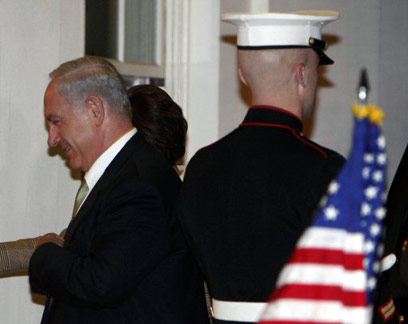
Israel, US leaders discuss stalled Middle East peace
White House meeting fails to provide any sign of progress toward jumpstarting stalled Israeli-Palestinian peace talks; PM cancels scheduled briefing for reporters. Barak to CNN: All options on table regarding Iran
WASHINGTON - President Barack Obama held unusually low-profile talks with Israeli Prime Minister Benjamin Netanyahu on Monday that failed to provide any sign of progress toward reviving Israeli-Palestinian peace negotiations.
A White House statement after the one-hour, 40-minute session framed the meeting in only general terms, saying the two leaders discussed "how to move forward on Middle East peace" and also spoke about Iran and security issues.
A spokesman for Netanyahu declined to comment on the talks and a briefing the prime minister intended to hold on Tuesday for reporters who accompanied him to Washington was canceled.
The meeting was also attended by National Security Adviser Retired Gen. Jim Jones, White House chief of staff Rahm Emanuel, special US envoy to the Middle East George Mitchell and Director for Near Eastern Affairs at the National Security Council Dan Shapiro.
On the Israeli side, Defense Minister Ehud Barak, National Security Council head Uzi Arad, Israeli Ambassador Michael Oren and Prime Minister's Office adviser Yitzhak Molcho joined Netanyahu.
Netanyahu, who began the day by publicly urging Palestinian President Mahmoud Abbas to negotiate immediately and drop a demand to halt Jewish settlement construction first, arrived at the White House after dark.
Contrary to normal practice with a visiting Israeli prime minister, reporters were not allowed in the Oval Office.

Netanyahu entering the White House (Photo: Reuters)
A senior Israeli official said before the talks that Netanyahu planned to tell Obama that "we mean business" and Israel was willing to be "generous in restraining" building in settlements in the West Bank to get peace talks started again.
Western-backed Abbas, who has said he has no desire to run in Palestinian elections in January, has accused Washington of failing to press Israel strongly enough on the settlements -- enclaves Palestinians fear will deny them a viable state.
Barak: All options on the table regarding Iran
Saying "no Israeli government has been so willing to restrain settlement activity," Netanyahu told a conference of American Jewish leaders: "I say today to Abbas ... let us seize the moment to reach a historic agreement. Let us begin talks immediately."
Israeli President Shimon Peres has asked Abbas to reconsider his threat not to take part in the Jan. 24 ballot, a decision that could plunge Palestinians deeper into political turmoil two years after Hamas Islamists seized control of the Gaza Strip.
Netanyahu made no such appeal in his speech at the conference of the Jewish Federations of North America.
Rejecting a complete freeze mandated by a US-backed 2003 peace "road map," Netanyahu has proposed temporarily limiting building in the West Bank enclaves to 3,000 housing units.
He has said east Jerusalem, also captured by Israel in a 1967 war, must be kept out of the equation.
"My goal is not negotiations for the sake of negotiations. My goal is to achieve a permanent peace treaty between Israel and the Palestinians -- and soon," Netanyahu said in his speech.
"Let's get on with it. Let's move," he said, echoing appeals he has made in the past.
Obama has eased US pressure on Israel over settlements, calling for restraint in construction where he had earlier pushed for a freeze.
Palestinians have voiced frustration at what they see as US backsliding on the issue, saying the shift in policy has killed any hope of reviving negotiations soon.
In Israel, the last-minute scheduling of the meeting after Israeli officials said over the past several weeks that Netanyahu hoped to see Obama, was widely seen as a sign of strained relations between the two leaders.
During a visit to the Middle East last week, US Secretary of State Hillary Clinton faced strong Arab criticism over the US stance on the settlement issue.
She insisted Washington still wanted a freeze on settlement construction but believed that resuming peace talks, suspended since December, was the best way to curb them.
Barak told CNN overnight that Israel supports a diplomatic solution to the Iranian nuclear crisis or the imposition of sanctions against Tehran, but added that all other options were on the table.
In the interview, the defense minister said time was of the essence because, according to him, Iran is already capable of producing one nuclear bomb.










